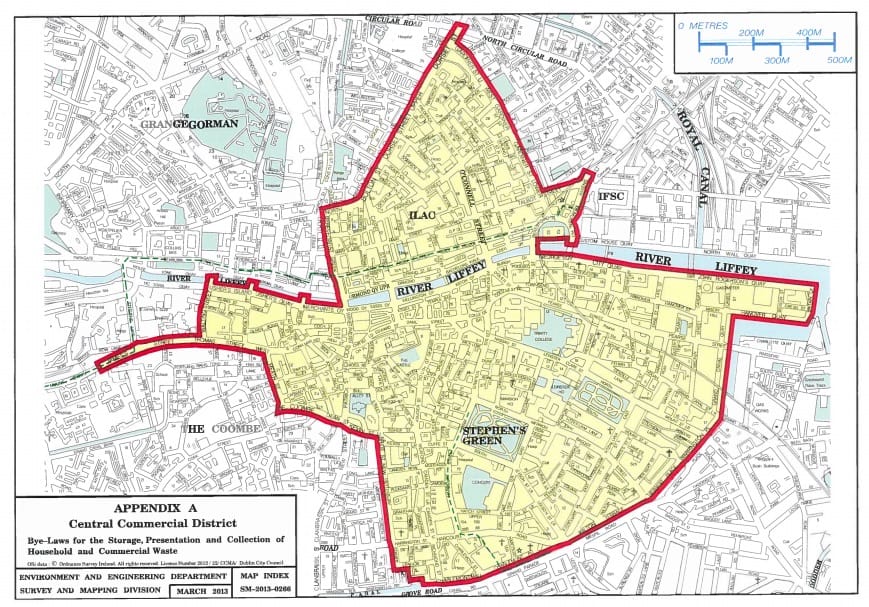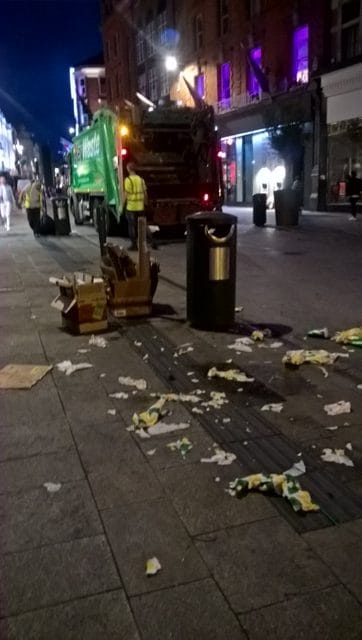What’s the best way to tell area residents about plans for a new asylum shelter nearby?
The government should tell communities directly about plans for new asylum shelters, some activists and politicians say.
Dublin City Council has fined waste-collection companies only 26 times in the last two years, according to a council press officer.

Waste-collection companies are breaking Dublin City Council bylaws by picking up rubbish out of hours – and doing a messy job of it, scattering litter down the streets, councillors say.
The council has done too little to punish them, councillors say. “The city council should not be found wanting in fining” waste-collection companies when they breach bylaws, says Fine Gael Councillor Ray McAdam, who is on the council’s waste subcommittee.
Some think the council isn’t giving the same amount of attention to companies that breach the bylaws, as to householders who break rules.
“An individual household can be held to account, but it seems the company cannot,” says People Before Profit Councillor Tina MacVeigh, who chairs the council’s waste subcommittee.
According to the waste-collection bylaws, collections should only take place in the central commercial district (see map below) between 7pm and midnight.

But independent Councillor Mannix Flynn says he has seen waste-collection companies collecting rubbish in the city centre in the middle of the night.
“I’ve gone around at two in the morning and witnessed all this for myself. They are constantly out in the middle of the night,” he says.
On Monday evening before 7pm, a Key Waste truck was edging its way down Camden Street, one man at the wheel and another flipping the wheelie-bin waste into the back.
The bylaws are there for a reason, says Flynn, who is on the council’s waste subcommittee. They limit the noise late at night, for example.
Councillor McAdam says a lot of the out-of-hours collections are because the waste-collection company missed bags and bins in the first place and goes back to get them later.
They “should have the ability to collect the rubbish”, he says. “I really can’t understand how they are missing as many bags and bins as they are across the inner city.”
In addition to collecting out of hours, Flynn says he has seen workers littering by failing to pick up rubbish left behind when a bag breaks.
McAdam says residents of Stoneybatter complained to him recently about waste-collection workers failing to clean up rubbish that came from their truck.
A Dublin City Council spokesperson said that littering by waste-collection companies is one of the main issues they receive complaints about.
But they haven’t fined for it recently. “No litter fines were issued to authorised waste companies over the last two years,” said the spokesperson.
Councillors complained specifically about Greyhound, but did not provide evidence of the company collecting after hours or littering. Greyhound did not respond before this was published to our emails seeking responses to several queries about these issues.

There are ways to sanction waste-collection companies that break the bylaws, or ignore the terms of their permits.
Dublin City Council can fine them. It did that 26 times in the last two years, according to a press officer, and it will do so in future “when appropriate” and if sufficient evidence is available.
Of those 26 fines, 13 were issued in the central area of the city in one month, July 2015. There were just six fines issued across Dublin in 2016.
The council can either fine a company a “fixed payment” of €75, or take them to court, in which case they’re liable for up to the oddly specific figure of €1,904.60, according to the bylaws.
In addition to council enforcement, the National Waste Collection Permits Office (NWCPO) can revoke licences of waste-collection companies.
In some local-authority flat complexes, residents have complained for years about the lack of recycling facilities.
Back in February, a spokesperson for Dublin City Council Press Office said that the council was responsible for recycling facilities – and that it was rolling them out in complexes alongside Greyhound.
However, according to Leo Duffy, programme manger at the National Waste Collection Permits Office (NWCPO), “All household kerbside waste collectors are required to provide both a recycling and food waste service to all households in Dublin, including apartment blocks.”
That’s in the conditions of the waste-collection permits. If those conditions are breached, that can be investigated by the local authority and lead to fixed-payment notices, court proceedings, and permit revocation, he said.
According to Section 6.6.2 of Greyhound’s licence, the permit holder has to provide a separate receptacle for recyclable waste.
Below that part of the licence, it notes that contravention of the condition “will initiate a review of the permit” under the Waste Management Act 1996.
Neither the NWCPO not Dublin City Council responded to queries as to whether the licence is under review.
The permits are reviewed every five years as standard, but they can also be reviewed at any time under legislation, says Duffy.
Local authorities are responsible for investigating non-compliance and the NWCPO decides whether or not to reissue the licence, he says.
When the NWCPO is looking at licence reviews, local authorities and the public can weigh in with submissions, says Duffy. As long as they relate to the permit conditions.
Councillor Flynn says that while a waste-management company could have its licence pulled for being non-compliant, that would threaten to leave many parts of Dublin without collection.
There might not be another company with the capacity to take on the work, he says. “If it got to a situation where it was catastrophic we would have to consider not renewing the contract, but that is the nuclear option because you don’t have other people there.”
Councillor McAdam thinks other companies could expand to fill the space.
Dublin City Council gets more than 10,000 complaints every year, but staff don’t know exactly how many relate to waste-collection companies, said a press spokesperson.
“To obtain exact figures as requested would be time consuming and quite possibly inaccurate or misleading as many complaints are not directly related to, or the responsibility of a waste-collection company, although it may have been logged as one,” she said.
The most common complaints about waste are out-of-hours and wrong-day collections, and trucks leaving the streets “badly littered” after they pass through, said the spokesperson. In these instances the council can intervene, she said.
But many of the complaints the council gets are for things it does not govern, she said. That’s down to a misconception that “the city council somehow exercises control over these companies and can direct them in how they operate from a customer service perspective”.
That includes complaints from customers unhappy that a company has forgotten to empty their bins, or that they have been overcharged, or that they can’t get collection in their area.
Where bylaws have been breached, the householders should complain to their local councillors, said Flynn.